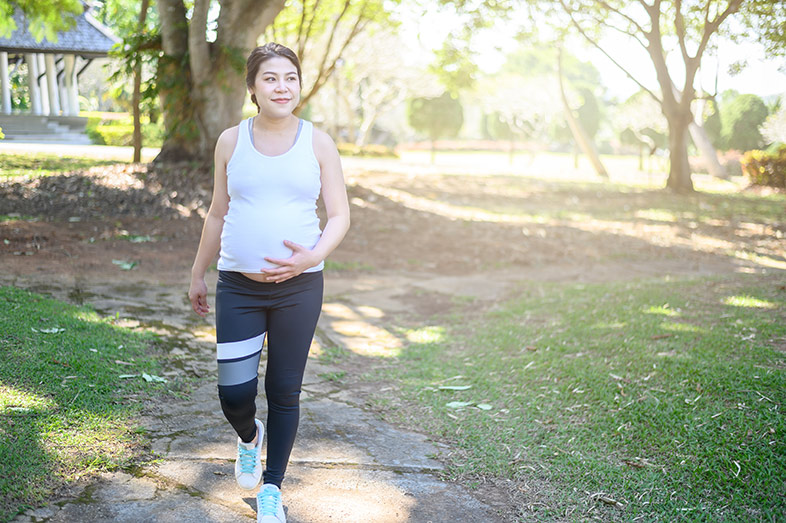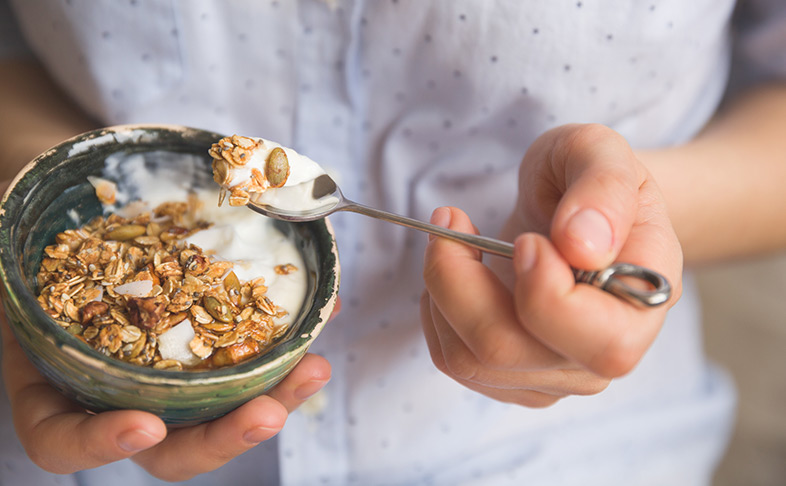Tired. Anxious. Terrible snoring. And that’s just your partner. Is pregnancy the end of quality sleep as we know it? In the first trimester, you’ll need to get up to pee constantly. As you get bigger, it’s hard to get comfortable. So, what’s the low-down on the lie-down?
Sleep positions during pregnancy
The official line on sleeping positions during pregnancy, according to Tommy’s charity, is that when you reach the third trimester, you should never sleep on your back. Try and always sleep on your side. This goes for naps, too. If you do wake up on your back, don’t panic but try a pregnancy sleep pillow or a wedge to keep you on your side if you tend to naturally sleep on your back.
Why can’t I sleep on my back during pregnancy?
Lying on your back puts pressure on blood vessels to your womb. This can restrict blood flow, and thus oxygen, to your baby. Studies have shown that babies become less active when their mother is lying on her back. And there’s some slight evidence that sleeping on your left-hand side is healthier.

1. Get moving
Too much energy can cause you to be restless at night. So, exercise daily – it releases endorphins, endocannabinoids and neurotransmitters, which help lower stress, and it helps with overall health. It’s a win-win.
2. Get some sun
Sunlight promotes higher levels of melatonin in your body, which maintains a good circadian rhythm (the body’s natural routine), which, in turn, helps you sleep. It also gives you vitamin D which helps you sleep too. Don’t forget a good sunscreen! In winter, or if you can’t get out much, take a vitamin D supplement.
3. Avoid naps and stay clear of the bedroom
If you’re not sleeping during pregnancy, avoid daytime naps (or keep it to 20 minutes if you must), as it may upset your night-time sleep routine. If you still have sleep problems, stay out of your bedroom, so you only associate it with sleep (and sex). Give your bedroom décor some love. Soothing colours, subtle lighting and a clutter-free space all help.

4. Eat well to sleep well
A healthy, balanced diet contains elements that aid sleep. Don’t let pregnancy cravings be an excuse to load up on junk. Foods high in tryptophan (an amino acid that promotes melatonin) are also helpful, including oats, pumpkin seeds, lentils, cheese, chicken, nuts and beans. Avoid a heavy meal before bedtime.
5. Cut out the caffeine
Caffeine is a stimulant, so avoid it, especially after lunch. Switch to decaf or give it up.
6. Go to bed with a clear head
Try reading a book or listening to gentle music instead of watching TV. If you have anxieties during your pregnancy, spend ten minutes before bed writing them down and planning solutions.

7. Have a bedtime routine and stick to it
Our babies thrive on bedtime regimes, so why not ourselves? Sleep cues can help you relax. Have a warm (never hot) bath, do gentle exercises such as yoga, then read. Wear an eye mask and earplugs if you are woken by sound or light, invest in blackout curtains and in warmer weather, keep a window open for fresh air. Sleeping naked is also supposed to help regulate body temperature.
8. Use sleep aids
Getting comfy with a bump is tricky. Placing a pillow between your knees can help support your hips and back during later pregnancy or invest in a good pregnancy pillow. Make sure your bedding is appropriate for the time of the year and think about a new mattress to give your body support. If you’re comfortable, you’ll find sleep easier.
9. Avoid the tech
Keep computers, phones, digital clocks and Wifi-enabled devices out of the bedroom. Avoid stimulants like the TV too, as the blue light inhibits sleep.
10. Don’t force it
Lying awake worrying about sleeping is counterproductive. If sleep won’t come, don’t force it. Instead, allow yourself to accept that you are awake and think about something positive: a holiday destination, baby names, a décor scheme. If you find that you get your best sleep in the morning, rearrange your routine so you get up later.


 your parenting partner
your parenting partner